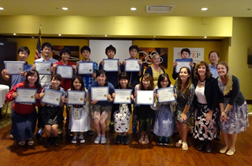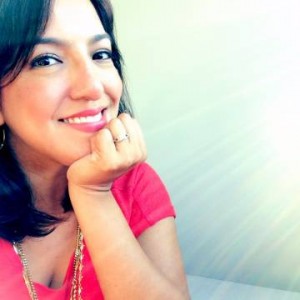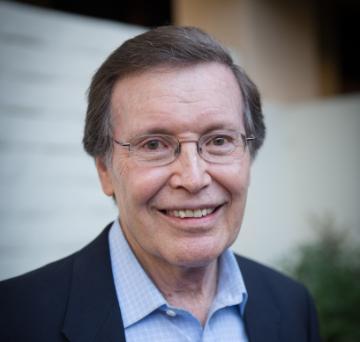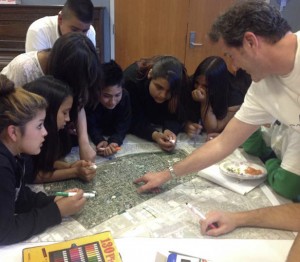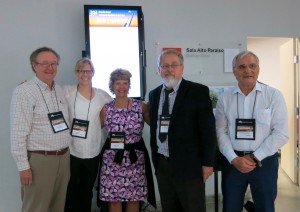
Dr. Resa Kelly, an SJSU chemistry associate professor, second from left, presented at the Brazilian Society for Chemistry and American Chemical Society meeting in May with Dr. Charles Atwood, Dr. Marcy Towns, Dr. Norb Pienta and workshop organizer Dr. Fernando Galembeck.
San Jose State University Associate Professor Resa Kelly learned that a desire to increase student success transcends borders this summer when she traveled to Brazil and Cuba to meet with researchers and educators who are focused on improving learning outcomes in chemistry.
Kelly serves as secretary of the American Chemical Society’s (ASC) Division of Chemistry Education (DivCHED) and is co-chair of its International Activities Committee this year. The committee is involved in finding ways to collaborate with international partners on improving learning in both secondary and university-level chemistry courses.
As a member of SJSU’s Science Education team and a faculty member in the chemistry department who began her teaching career at the high school level, Kelly brings a unique understanding of the challenges of teaching chemistry at different educational levels.
She was invited to Goiânia, Brazil in May as part of ACS’s International Activities Committee to present at the Sociedade Brazileira de Quimica (Brazilian Society of Chemistry.) The goal of the visit was to promote global collaboration among chemical education researchers.
Kelly is one of three DivCHED representatives who participated in a workshop on “Teaching Chemistry: Vision, Practice and Achievements” hosted by Dr. Fernando Galemback. Kelly’s presentation, “Insights into US Science Teacher Preparation in California and Research Exploring the Design and Development of Chemistry Visualizations,” provided an overview of the SJSU teacher credentialing process emphasizing the role of Next Generation Science Standards and Common Core Standards in teacher training.
She also addressed research she is conducting that is funded by the National Science Foundation that is aimed at developing visualizations to boost deeper learning. She has worked with animators to create short videos about the atomic level details of chemical reactions that are in conflict with each other.
“The overall goal is that we shouldn’t tell students this is right or wrong,” she said. “We want to connect them to the evidence and hope over time, with practice, they will be able to justify why one model is preferred over another.”
In June, Kelly traveled to Villa Clara, Cuba to present at the International Symposium of Chemistry. She and Dr. Charles Atwood, DivCHED IAC co-chair, were invited to speak during the Ernest Eliel Symposium on Chemical Education. The symposium brought together 50 Cuban educators to discuss the nature of teaching and learning in Cuba and the United States.
“In spite of the different cultural background, we discovered that many of our educational concerns were mutually shared,” Kelly said. “For example there was much discussion about motivating students to learn, easing the transition from secondary school to college chemistry, dealing with the limitations of technology and recognizing its usefulness, and embracing collaborative learning models with practice-based approaches.”
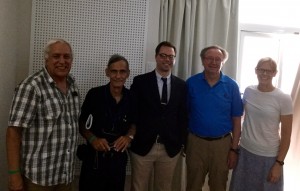
Dr. Resa Kelly, far right, spoke at the International Symposium of Chemistry in Cuba. She is pictured here with Dr. Luis Montero Cabrera, Dr. Manuel Alvarez Prieto, Dr. Thomas Bussey and Dr. Charles Atwood.
Atwood and Kelly plan to visit chemistry classrooms and laboratories at the University of Havana as well as some secondary schools in the near future. Along with Atwood’s colleague Dr. Joel Harris, they were awarded ACS Innovative Project Awards to invite Cuban delegates to visit SJSU and other universities in the U.S. in spring 2017 to brainstorm ways to collaborate on future teaching and learning projects.
